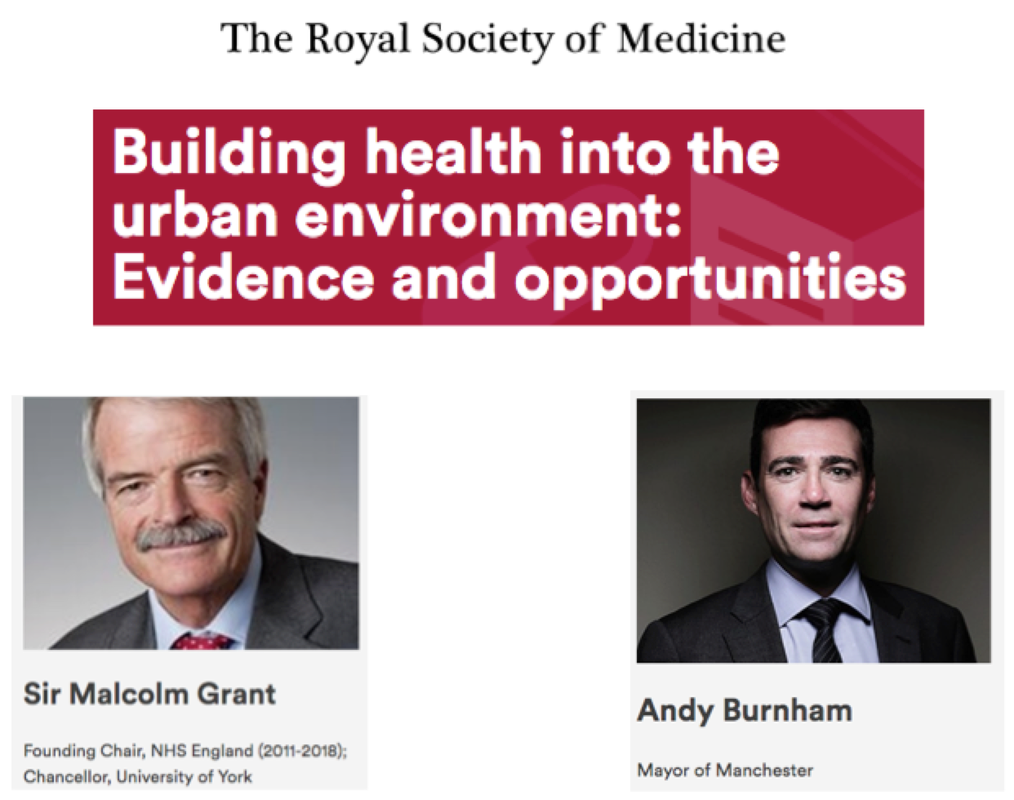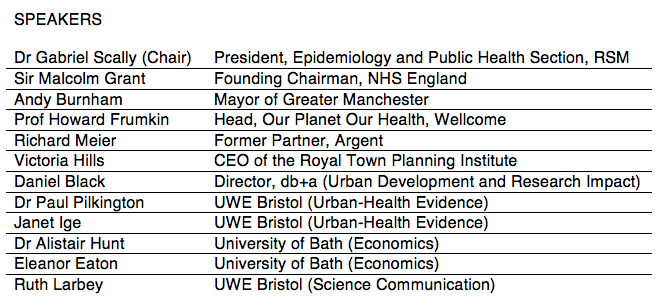|
In December 2018, the Royal Society of Medicine (RSM) held a day-long conference that brought senior decision-makers from the NHS, city government and the urban development community together with major research funders and academics leading some of the latest research in the field of healthy urban development. The event was hosted by the Epidemiology and Public Health Section of the RSM, and chaired by its President, Dr Gabriel Scally. Dr Scally set out the headline challenges facing urban development decision-makers in terms of the growing burden of non-communicable disease and environmental costs, before introducing the first keynote speaker, Sir Malcolm Grant, Founding Chairman of NHS England.
Sir Malcolm provided delegates with a rare and valuable insight in to the history of the NHS, the critical and growing importance of prevention to the healthcare sector, and why the NHS has recently shifted some of its focus and considerable resource to a new Healthy New Towns programme, which explores new models of healthcare and digital futures, as well as the design of health-oriented developments. The second keynote was Professor Howie Frumkin, the new Head of Wellcome’s pioneering Our Planet Our Health programme. Professor Frumkin calmly presented a devastating picture of a planet and a people under existential threat from a multiplicity of environmental challenges, using the analogy used most recently by 16-year old environmental activist, Greta Thunberg - ‘our house is on fire’ - while also underlining the critical importance of research in enabling solutions. Dr Paul Pilkington and Janet Ige from UWE Bristol’s Department of Health and Social Sciences then described the state of the evidence: what we know, and don’t know, about the interaction of environment and health. This was based on a comprehensive review of the health literature in five areas - transport, buildings, natural environment, neighbourhood design and food – and where the gaps in evidence appear to be. Of a total of 26,428 publications retrieved, 209 were taken forward for review. Example key findings include:
Dr Alistair Hunt and Eleanor Eaton from the University of Bath’s Department of Economics presented their work on the economic cost of getting it wrong, and the bonus of getting it right. They had valued the potential change in human health between standard and optimal urban environments based on 26 characteristics of describing the built environment and 60 linked health outcomes. Their model includes cost of medical treatment, loss of productivity and a measure reflecting the pain and suffering associated with illness and mortality. Bearing in mind the varying evidence base as set out above, the top five characteristics that according to this valuation have the largest potential for impact on health were: green space, air quality, noise, overheating and proximity to a main road. After lunch Ruth Larbey of UWE Bristol’s Science Communication Unit spoke about her team’s experience in undertaking a range of public engagement activities, including: the design and exhibition of the sculpture ‘Inhale’, a diesel soot particle three million times larger than real life, made by renowned artist, Luke Jerram; the development of an interactive web-game tested with local communities and used in classrooms; and a wide range of community events using jigsaw games, wish trees and citizen-led walks. Andy Burnham, Mayor of Greater Manchester, then delivered a humorous, passionate and engaging talk (without any notes or props) on his experiences in Government and as Mayor of one of the fastest growing and vibrant cities in the country. He focused specifically on how cities can get development right for their future health and wellbeing. He highlighted both specific aspect such as the connections between transport and physical activity and the general principles of how we need to build communities not just houses. Daniel Black, Director of db+a, first set out four key challenges in achieving impact in this area:
Daniel presented the main barriers and opportunities for creating healthier urban development drawing on thirty interviews with senior decision-makers from the UK’s main delivery agencies: city council, volume house-builder, real estate developer, district council, development corporation, regeneration joint venture and a start-up social investment vehicle. Main findings include:
Richard Meier, former Partner at Argent, then spoke of his experiences in overseeing the £3 billion redevelopment of King’s Cross in central London, one of the largest and highest profile city centre developments in the country. Finally, Victoria Hills, former CEO of the Old Oak and Park Royal Development Corporation and incoming CEO of the Royal Town Planning Institute, spoke about her experience in leading one of the UK’s largest development corporations and her new role leading the largest planning institute in Europe, founded in 1913, with over 25,000 members. The RTPI has a long history of engaging with the health community, not least following the Public Health Acts of the 19th Century and the Housing and Town Planning Acts of the early 20th Century. More recent RTPI research has focused on promoting healthy cities and tackling climate change. Dr Scally brought the day to a close by reminding the audience of the critical need for research to have impact, citing the quote: “The philosophers have only interpreted the world, in various ways; the point is to change it". A description of the event and its full agenda can be found on the RSM website: https://www.rsm.ac.uk/events/epidemiology-and-public-health/2018-19/epm01/ Presentations from the day can be found on the UPSTREAM website. Comments are closed.
|



